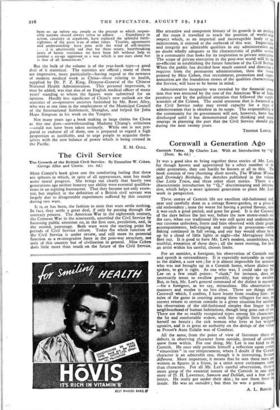The Civil Service
The Growth of the British Civil Service. By Emmeline W. Cohen. (George Allen and Unwin. los. 6d.) Miss COHEN'S book gives one the comforting feeling that there are spheres in which, in spite of all appearances, man has made some moral progress. She brings out clearly that barely two generations ago neither honesty nor ability were essential qualifica- tions in an aspiring bureaucrat. That they became not only essen- tial, but implicit in the definition of a British civil servant was largely due to disagreeable experiences suffered by this country
during two wars. •
It is, or has been, the fashion to state that wars settle nothing. In fact, they settle a great deal, if only by passing through the contrary process. The American War in the eighteenth century, the Crimean War in the nineteenth, unsettled the Civil Service by focussing public attention on, in the first case, peculation, and, in the second, patronage. Both wars were the starting point for periods of Civil Service reform. Today the whole function of the Civil Service is under review, and still more its potential function as a re-integrative force in the post-war structure, not only of this country but of civilisation in general. Miss Cohen does little more than touch on the future of the Civil Service. Her attractive and competent history of its growth is an analvsls of the route it travelled to reach the position of world-Avid, respect which, as an impartial and incorruptible body of ad. ministrators, it enjoyed at the outbreak of this war. Impartiality and integrity are admirable qualities in any administration and no doubt wholly adequate as the characteristic of public service in a community that looks for its inspiration to private enterprise. The scope of private enterprise in the post-war world will be the co-efficient in establishing the future function of the Civil Service. When the public has decided how much control and direction it requires from the permanent administration, then the lesson pointed by Miss Cohen, that recruitment, promotion and super, animation are the foundation stones of the qualities characterising the Service, will have to be borne in mind..
Administrative incapacity was revealed by the financial atten. tion that was attracted by the cost of the American War of In& pendence and by the political attention that followed the supply scandals of the Crimea. The social attention that is focussed en the Civil Service today may reveal capacity for a type oi administration that is obsolete in its scope. The responsibility of the community for its government will not, however, have been discharged until it has demonstrated clear thinking and morn: courage in planning the part that the Civil Service should play during the next twenty years.
THOMAS LODGE.


































 Previous page
Previous page